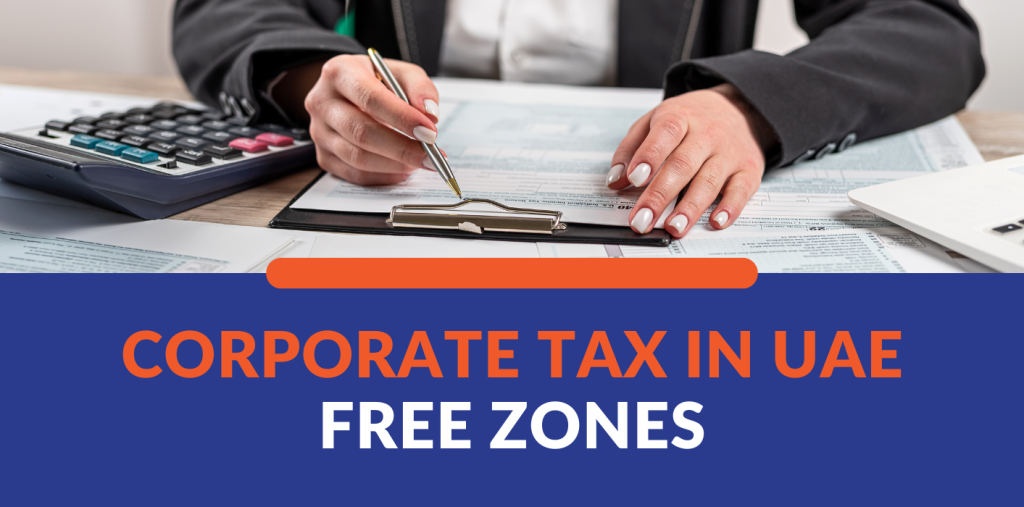The United Arab Emirates (UAE) has long been known as a tax-friendly jurisdiction, particularly through its network of free zones that have historically offered tax exemptions as a key incentive for foreign investment. However, with the introduction of the UAE corporate tax regime in 2023, the landscape has evolved significantly. Free Zones are not totally tax free with certain qualified activities only enjoying the tax-free status. Here we will understand how corporate tax in UAE free zone applies to businesses operating in UAE free zones, the exemptions available, and what businesses need to know to maintain their tax-advantaged status.
UAE Corporate Tax Framework: An Overview
The UAE implemented its corporate tax system with Federal Decree-Law No. 47 of 2022, introducing a 9% standard corporate tax rate that became effective for financial years starting on or after June 1, 2023. This marked a significant shift from the previous system where most businesses outside of specific sectors faced no corporate income tax.
The corporate tax applies to all business activities conducted in the UAE, with certain exceptions. You can find more about Corporate Tax in UAE in our comprehensive guide for 2025 and beyond. Notably, the law includes special provisions for businesses established in free zones, allowing them to maintain much of their tax-advantaged status under specific conditions.
UAE Free Zones: The Cornerstone of Tax Incentives
Free zones in the UAE were established to attract foreign investment by offering various incentives, including:
- 100% foreign ownership
- No currency restrictions
- Simplified administrative procedures
- Custom duty exemptions
- VAT Exemptions
- Repatriation of capital and profits
Above all, the most attractive feature has been the promise of tax exemptions, which continues in a modified form under the new corporate tax regime.
Corporate Tax in UAE Free Zone: The Qualified Free Zone Person
Under the new corporate tax law, businesses in free zones can benefit from a 0% tax rate if they qualify as a “Qualified Free Zone Person” (QFZP). To achieve this status, a business must:
- Be registered in a free zone under its regulations
- Maintain adequate substance in the UAE
- Derive qualifying income as defined in the law
- Comply with transfer pricing rules and documentation requirements in case you have international transactions with related parties
- Not have elected to be subject to the standard corporate tax rate
The concept of “adequate substance” is particularly important, requiring businesses to have physical presence, have employees performing relevant business functions, must have significant economic presence and genuine economic activities in the free zone.
Establishing and maintaining “adequate substance” in UAE free zones can be challenging for businesses unfamiliar with local regulations. Stratrich specializes in helping businesses establish in Free Zone that satisfies regulatory requirements and have adequate substance while aligning with their operational needs.
Qualifying Income for Free Zone Tax Benefits
Not all income earned by a free zone business qualifies for the 0% tax rate. According to the corporate tax law, qualifying income includes:
- Income from transactions with businesses outside the UAE
- Income from transactions with other qualified free zone persons
- Income from transactions with UAE mainland businesses, subject to certain restrictions
Conversely, income from the following activities is taxable at the standard 9% rate:
- Transactions with natural persons in the UAE
- Transactions with UAE mainland businesses beyond certain thresholds
- Income from branches or permanent establishments outside the free zone
- Income from immovable property in the UAE mainland
The Distinction Between Passive and Active Income in Free Zones
The corporate tax law distinguishes between passive and active income earned by free zone entities:
Active Income: Business income derived from the entity’s core licensed activities in the free zone can qualify for the 0% tax rate.
Passive Income: Income such as interest, royalties, dividends, and capital gains may be subject to different tax treatment. Specifically:
- Interest income can qualify for the 0% tax rate if derived from qualifying activities
- Dividend income is generally exempt under the participation exemption
- Capital gains on shares may be exempt under certain conditions
- Royalty income is generally taxable unless it constitutes qualifying income
Maintaining Free Zone Tax Benefits: Compliance Requirements
To maintain the preferential tax treatment in UAE free zones, businesses must:
- File annual corporate tax returns
- Maintain proper accounting records and financial statements
- Submit transfer pricing documentation where applicable
- Report transactions with related parties
- Avoid artificial arrangements designed to obtain tax advantages
The Corporate Tax Authority has emphasized that substance requirements will be strictly enforced, with businesses needing to demonstrate that they have genuine economic activities in the free zone.
Transitioning to the New Corporate Tax Regime in Free Zones
Free zone businesses established before the introduction of the corporate tax law may hold tax exemption certificates issued by the respective free zone authorities. While these certificates remain valid until their expiration, they do not override the new corporate tax law. Businesses must assess their operations against the new criteria to determine if they qualify for the 0% tax rate.
Strategic Considerations for Free Zone Businesses
For businesses operating in UAE free zones, several strategic considerations should be evaluated:
- Entity Structure: Review your current entity structure to optimize tax benefits. This may involve separating mainland and free zone operations.
- Supply Chain: Analyze your supply chain to ensure that transactions qualify for the 0% tax rate.
- Substance Requirements: Ensure that your free zone entity has adequate substance in terms of employees, offices, and economic activities.
- Transfer Pricing: Implement robust transfer pricing policies for transactions between related entities.
- Documentation: Maintain comprehensive documentation to support your free zone status and qualifying income.
Conclusion
The corporate tax in UAE free zones represents a balanced approach, maintaining the UAE’s attractiveness for foreign investment while aligning with global tax standards. Free zone businesses can still benefit from significant tax advantages, but must now navigate a more complex regulatory landscape.
For businesses operating in UAE free zones, understanding the nuances of the corporate tax law and ensuring compliance with substance requirements will be crucial for maintaining their tax-advantaged status. As the implementation of the law continues to evolve, staying informed about regulatory updates and seeking professional advice will be essential for optimizing tax positions in this new era of UAE taxation.








